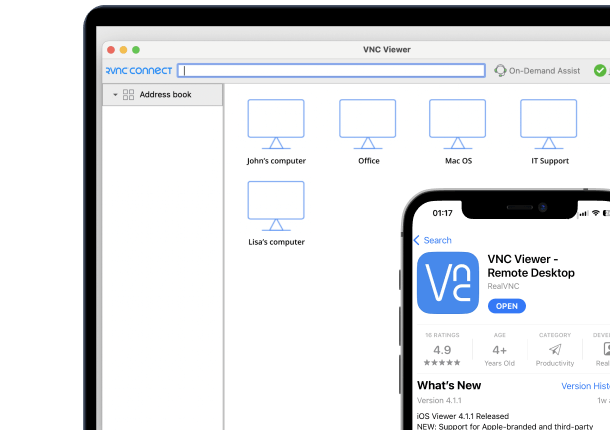As an idea of their popularity, sales of the Pi reached 19 million by March 2018.
As providers of a remote access solution built into Raspberry Pi’s operating system, we had the chance to talk with many of its users and heard about some really innovative use cases. We decided that our experience was worth sharing to help other entrepreneurs and startup founders benefit from these affordable tools to boost their business.
In this post we’ll examine ways in which combining the Raspberry Pi with a remote access solution can allow small businesses and startups to make the most of limited budgets and offer them opportunities to drive their growth.
Raspberry Pi and remote access in the office
Raspberry Pi is a series of small board computers developed by Cambridge’s own Raspberry Pi Foundation, just around the corner from RealVNC’s offices. One of the attractions of the Raspberry Pi, and one of the reasons for this former startup’s impressive success, is its price.
The latest generation of Raspberry Pi, the Raspberry Pi model 4, retails for around $35, a fraction of the cost of a normal PC. But just because this credit card-sized board is cheap, it doesn’t mean that it’s underpowered. Many businesses have demonstrated that, with a little ingenuity, the Pi can be used in lots of creative ways as a powerful business asset.
With its low unit cost, the Pi allows companies with limited means to maximize their budget. Combined with remote access, the Pi can offer cost-effective ways in which to fulfil your office IT requirements.
For example, staff can be issued with a Pi rather than a desktop computer to allow them to work from home and remotely access company assets from their own device. One of the many benefits of this is to allow your company to buy the bare minimum of potentially expensive IT equipment for their offices (for example, equipment to support high-end IT functions, such as running servers).
With employees working regularly from home, especially during the COVID-19 pandemic, a startup or other small business has an opportunity to reduce the often considerable costs of leasing office space. If fewer workers are in an office at any one time, it becomes possible to start by renting smaller (and cheaper) premises or opt for a co-working space, a major consideration given that rents are a large part of any company’s expenses.
Other potential cost savings might include conducting staff training and collaboration with third parties via Raspberry Pi-enabled IT, saving travel and other expenses for your company.
Possible creative and money-saving uses of the Pi and remote access in an office environment could include setting up a Voice Over Internet Protocol (VOIP) phone system, rather than installing an expensive solution. Staff can have access through the system to calls and voicemails from anywhere. It’s even possible to use a Pi to create an IT help desk ticketing system to complement IT support to office and home workers.
Another less obvious application of remote access for startups with limited funds is the ability to share resources on a single computer. For example, you might have important software on just one computer that users can access through expensive individual licences. Several of your staff need access to it simultaneously, but buying multiple licences would really make a dent in your budget.
However, if you are able to run the software on the Raspberry Pi instead of a PC, multiple remote users may be able to share the resources on it. Only one licence is needed for the software, but multiple employees can make use of the program.
Business applications of Raspberry Pi and remote access: PoS systems, solar panels and more
The benefits of using remote access via a Raspberry Pi are not just limited to office-based companies. Although they may have different requirements, industry and retail startups can also take advantage of the flexibility and low cost of the Pi to enable remote access.
To provide a real-life example, a startup manufacturer of custom clothing uses our remote access software on the Pi to help produce their goods in a different European country. This enables them to take advantage of lower business rates, smaller wage bills, cheaper raw materials, potential local business incentives, and so on.
Using the Pi combined with a remote access solution enables them to communicate with staff at the remote site. It also allows the company to monitor the manufacturing process remotely; knowing, for example, when material was cut and processed and when customer orders are dispatched.
Such remote monitoring can also be extended to other scenarios. The Raspberry Pi can be fitted with a variety of peripherals such as cameras, electronic control systems, environmental monitors, and so on. This offers companies the opportunity to come up with a number of creative solutions to business problems, saving them time and money. For example
- Raspberry Pis have been used to power ventilators during the coronavirus pandemic.
- A company using Raspberry Pi and VNC Connect to monitor and support thousands of solar panels – see Centurion Solar case study
- A food company that uses the Pi installed in a cold store to monitor environmental conditions like temperature and humidity remotely and alert staff if any problems are detected.
- Using a Raspberry Pi fitted with a camera and motion detector to remotely monitor company premises as an affordable security solution.
- Remotely controlling the power supply and equipment at a remote location. This could cover anything from office lighting and heating to industrial equipment in a factory.
- In a retail or catering environment, using the Pi and remote access to run a Point of Sale (PoS) system to process and monitor transactions at multiple locations.
- Updating commercial digital signage remotely.
With the Raspberry Pi and a remote access solution, startups and small businesses can maximize the resources that they have through the smart use of affordable technology, boosting their business in their crucial early years.
We hope that this post has given you some ideas about what you can achieve with these two technologies. You can find out more about how to choose the best remote access solution for you here, or give it a go yourself by enabling VNC Connect on your Raspberry Pi.
You can also try VNC Connect for free for 14-days.






